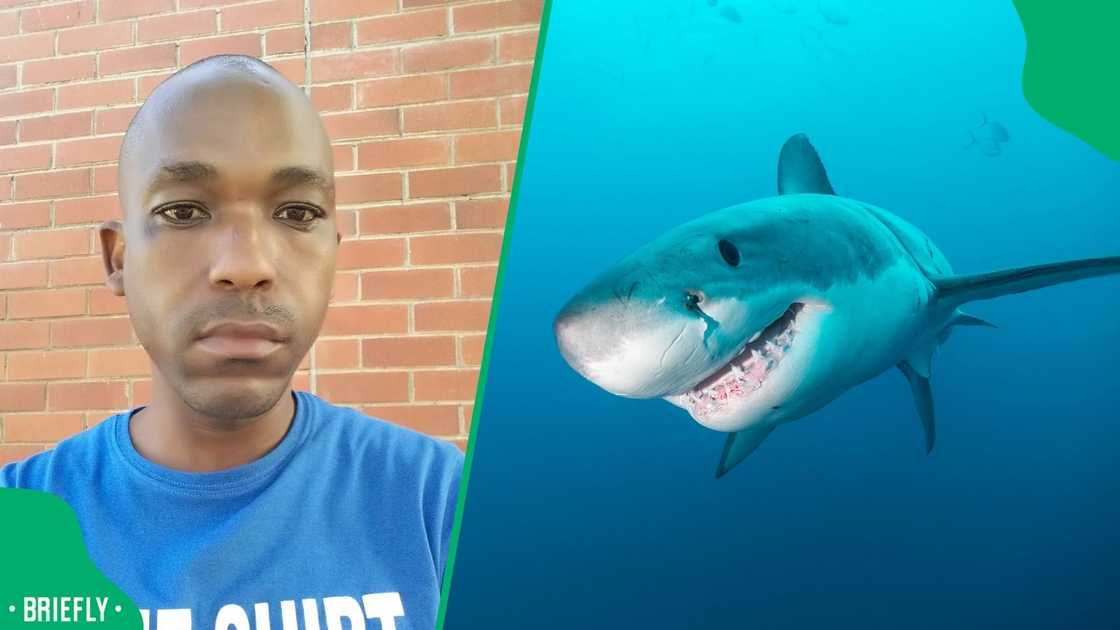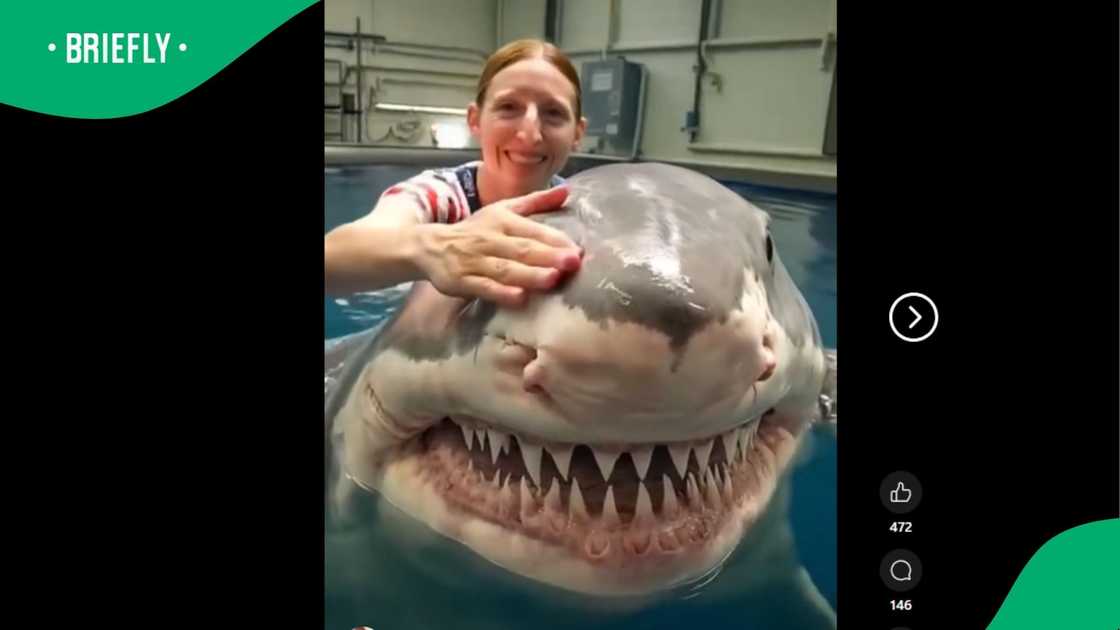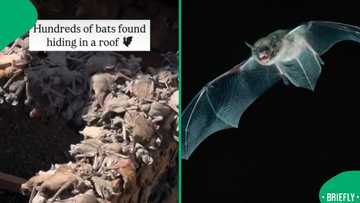“Sharks Eat Their Siblings and You Think You Can Tame It”: Woman Pets Shark, No Consequences
- A bizarre video shared by content creator @sbusiso.thabede shows a woman confidently holding onto a shark's back, touching its face, and even pulling up the skin above its mouth
- Despite the shark's muscle movements, blinking eyes, and visible teeth, the woman seems completely unafraid, smiling throughout the unusual encounter
- While most people would never dare to touch a shark, there are five friendly shark species in the ocean

Source: UGC
A strange video making rounds on social media shows a fearless American woman petting and handling a shark without any fear in what looks like the inside of an aquarium. The clip, posted by content creator @sbusiso.thabede during March, has left many viewers shocked as the woman confidently holds onto the back of the shark and even touches its face.
In the video, the camera zooms in on the shark's face, where you can see its muscles working and parts of its body moving. The shark blinks its eyes several times while the woman continues to hold its face. At one point, she even pulls up the skin just above the shark's mouth, making its teeth more visible. Throughout the interaction, the woman seems completely at ease, smiling as she handles the dangerous sea creature.
Watch the Facebook reel below.
PAY ATTENTION: Briefly News is now on YouTube! Check out our interviews on Briefly TV Life now!
Friendly sharks do exist
There are several shark species known to be relatively harmless to humans. Of the more than 500 shark species, only a handful have ever been known to attack people.
The whale shark is the largest fish in the ocean. Basking sharks are the second largest fish in the world and, like whale sharks, they're filter feeders, known to open their mouths wide enough to fit a person inside, but they do this to eat tiny sea creatures.
Nurse sharks are bottom feeders that are usually lazy during the day and more active at night. They're a favourite among divers because they usually swim calmly around humans without showing aggression. Despite their scary appearance, goblin sharks aren't dangerous to humans. These deep-sea sharks have a protruding snout and scraggly teeth, but human interactions with them are rare due to their deep-water habitat.
Angel sharks are smaller sharks that spend most of their time hiding at the bottom of sandy seabeds. They're generally calm and only attack when they feel threatened.
Briefly News spoke to animal expert Jayshri Rangasamy regarding caution when interacting with animals. She stated:
"While domesticated animals can exhibit sudden changes in behaviour due to their natural instincts, trained wild animals pose even greater risks. Despite training, wild animals retain their natural instincts such as predatory instincts, protective instincts, territoriality and fear/stress response, which can lead to unpredictable and even dangerous behaviour under certain conditions. For example, big cats and elephants can react aggressively if threatened or uncomfortable."
She also shared that:
"Even dolphins, though intelligent and seemingly friendly, can bite or ram people, causing significant harm. Household pets, though generally safer, can also become aggressive if threatened, in pain, or protecting their territory. Bites and scratches from pets can lead to serious infections and diseases such as rabies, Capnocytophaga, and Pasteurella. Therefore, it's crucial to exercise caution around both trained wild animals and household pets to ensure safety for humans and animals."

Source: Facebook
Social media reactions to the brave shark tamer
The unusual video prompted varied responses from viewers:

Read also
"Thank God and your ancestors": Man startled by huge snake in an engine, SA says it's spiritual warfare
@SifisoFisoh warned:
"This thing... From when it was conceived it was hunting, it ate its siblings in its mother's belly and wena, you think you can tame it?"
@SburraDeville Tau claimed:
"Sharks die when they don't move, they must be always in motion... This one is a clone 🤞"
@AbubakarJabaar noticed:
"Did that shark just blink its eyes?"
@BonginhlanhlababaKaSukoluhle Dlamini joked:
"🤣😂 They look the same."
@MauriceMowNazombe suggested:
"Father and daughter maybe 🤔🤔🤔"
@MadumMntungwa added:
"But I think the shark is the father because they look alike."
Other wild animal encounters that shocked viewers
- Briefly News recently reported on an elderly gentleman who took on an alligator armed with nothing but a frying pan.
- A local woman celebrated her birthday with two small tortoises in her home, sharing a video of all three of them lying on her bed.
- A terrifying discovery was made in Stellenbosch when a woman found a deadly puff adder snake lying next to her dogs' beds on her veranda.
Source: Briefly News

Nerissa Naidoo (Human Interest Editor) Nerissa Naidoo is a writer and editor with seven years of experience. Currently, she is a human interest writer at Briefly News and joined the publication in 2024. She began her career contributing to Morning Lazziness and later joined Featherpen.org. As a TUW ghostwriter, she focused on non-fiction, while her editorial roles at National Today and Entail.ai honed her skills in content accuracy and expert-driven editing. You can reach her at nerissa.naidoo@briefly.co.za

Jayshri Rangasamy (Medical Scientist - Pharmacologist - Clinical Team Lead) Jayshri Rangasamy, Fortrea's Clinical Operations Delivery Leader, oversees the company's Clinical Team. She has extensive experience in both infectious diseases (tuberculosis, Ebola, COVID-19) and non-infectious diseases (cardiovascular, endocrinology, and gastroenterology), as well as oncology (lung cancer, hematologic malignancies). Rangasamy, who holds a MS and BS in Pharmacology and Human Physiology from the University of Pretoria, is an advocate for empathetic leadership. She's also a certified Latin and ballroom dancer.


